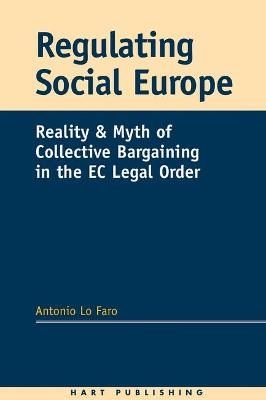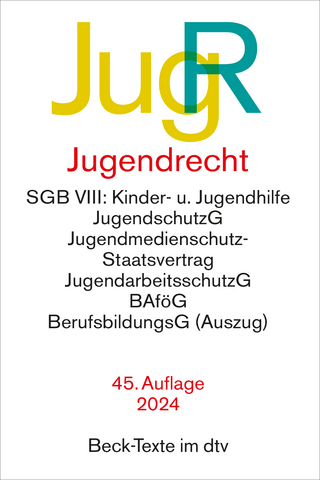
Regulating Social Europe
Hart Publishing (Verlag)
978-1-901362-90-9 (ISBN)
- Titel nicht im Sortiment
- Artikel merken
A large part of the legal debate about European social integration has been focussed on social dialogue, and in particular on the role of European collective agreements, as formerly regulated by the Maastricht Agreement on Social Policy, but now incorporated into the Amsterdam Treaty. In this volume, an attempt is made to conceptualise the function of European collective bargaining, based on an analysis of the Treaty provisions specifically dealing collective bargaining, but going beyond the Treaty in several respects. Taking an inter-disciplinary approach, the book seeks to broaden the analysis of European collective bargaining, placing it within the broader institutional context of the phenomenon usually referred to as "EC regulatory deficit". Against this background the author gives proper recognition to the different factors - legal, theoretical, institutional, political and industrial-relations oriented - which converge in the field of European collective bargaining.
The author concludes that in the overall context of a general redefinition of Community regulatory strategies, European collective bargaining should be viewed not as evidence of an incomplete supranational legal pluralism but rather as a construction of Community law.
Antonio Lo Faro is a Professor of Law at the University of Catania,Sicily.
Introduction - subject and scenario - defining the framework of the study. Part 1 A "community based on the rule of law": from the White Paper on completing the internal market to today - apogee and decline of the community harmonisation model; the role of law in the European integration process; labour law and the institutional context - a methodological note. Part 2 Social complexity and regulatory dilemmas in the community system: regulatory deficit and alternatives to legislation - the post-positivist labour law tradition - at the root of the regulatory illusion - loss of the epistemic authority of law, an evergreen paradigm - legal pluralism; the peculiar nature of the community legal order - legal sovereignty lost "twice over" - some symptoms of the community harmonisation model's regulatory deficit, "first generation" alternatives - mutual recognition, regulatory competition, standardisation, "second generation" alternatives - the agency model, and in labour law - the "quomodo" of social Europe. Part 3 European collective bargaining - between old systems and new realities: in the beginning there were collective autonomy, pluralism and collective laissez-faire; and on the seventh day the Maastricht Summit created European Collective Bargaining; the "functional singularity" of European Collective Bargaining and interpretative tools - an interim summing up. Part 4 European Collective Bargaining and hermeneutic categories - the need for a new theoretical framework: private law classification of collective agreements and trade union "agency" in the community system; collective autonomy and European Collective Bargaining - the many reasons for an incompatibility - a collective autonomy without employees?; pluralism and collective autonomy in the community system - social pluralism and rationalisation in terms of collective labour law. Part 5 An unhappy alternative: "inconsequential" collective bargaining - the normative function of collective bargaining and the (non-existence of the) principle of freedom of association in the community legal order, a European collective laissez-faire?, state law and the "law" of the industrial relations system, freedom of association and the legal status of collective agreements; "tied" collective bargaining - pre-set limits, and subsequent assessments, legality, representative status, small and medium-sized enterprises, general approval; lessons from experience - Directive 96/34/EC on parental leave, Directive 97/81/EC on part-time work and Directive 99/70/EC on fixed-term work. Part 6 Collective agreements as a resource of the community legal order: "public law" collective agreements and neo-corporatist models in the community system - a still unlikely prospect; collective bargaining as a resource of the community legal order - European collective bargaining as a regulatory resource, European collective bargaining as a legitimacy resource; regulatory techniques and a European social constitution.
| Erscheint lt. Verlag | 1.4.2000 |
|---|---|
| Verlagsort | Oxford |
| Sprache | englisch |
| Maße | 156 x 234 mm |
| Themenwelt | Recht / Steuern ► Arbeits- / Sozialrecht ► Sozialrecht |
| Recht / Steuern ► EU / Internationales Recht | |
| Recht / Steuern ► Privatrecht / Bürgerliches Recht ► Zivilverfahrensrecht | |
| ISBN-10 | 1-901362-90-6 / 1901362906 |
| ISBN-13 | 978-1-901362-90-9 / 9781901362909 |
| Zustand | Neuware |
| Haben Sie eine Frage zum Produkt? |
aus dem Bereich


